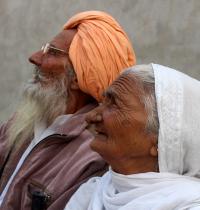Nirmala
Grant Period: One year and six months
Nirmala is an independent scholar based in Kurukshetra. She has completed her PhD from the Central University of Haryana. She has extensively written on folk literature in various reputed Hindi magazines and journals and compiled a book of Haryanvi folk songs. She is also a folk singer and theatre practitioner.
This grant will enable Nirmala to study how folk songs in Haryana have kept alive the memories of the Partition of India. It is an attempt to look beyond the conventional modes of history writing and explore the sociocultural sphere to investigate the lasting effects of the divide on the daily lives of the survivors, with a focus on women. While compiling a book of Haryanvi folk songs in 2014, Nirmala discovered that the tragedy of Partition is also alive in folk songs of the region. A short detour from her project brought her to a rich repository of songs that are exclusively dedicated to the partition and its impact on people. Predominantly remembered by people who migrated from the other side of the divide, over time these songs have merged in the larger oeuvre of folk tradition of Haryana. However, they retain a distinct identity because, unlike other folk songs, they talk of specific events in time and the memories associated with them.
According to Nirmala, the discourse on the Partition of India usually limits itself to Bengal and Punjab. Since Haryana was part of Punjab during that time, very little is written about the areas that were severely affected by the divide. The case of Haryana is peculiar also because it was divided twice - first, during the Partition of India, and later in 1966, when Haryana was separated from Punjab to become an independent State. During the Partition of India, women suffered the most. They were subject to abduction and rape. While of late, many accounts of such brutality finally have been brought to the light, the women from the margins who underwent the same ordeal have not found a place in the mainstream or local discourses on Partition.
Nirmala argues that in the absence of any documented evidence about the displacement and suffering, women who migrated to Haryana took it on themselves to keep the memories alive through songs as a collective expression of events that they witnessed which altered and transformed their lives forever. Since the songs are predominantly sung by women, they remain doubly marginalised and ignored by the local discourse on the folk tradition of Haryana. This is a critical reason that brings Nirmala to this project.
Nirmala will conduct a series of in-depth interviews with folk singers and a select set of women who sing folks songs related to the Partition across twenty-two districts in Haryana. Simultaneously, she will also study the discourse in local languages in Haryana to understand how Partition is written about. Her aim through this project is to shift focus from the dominant discourse on Partition and draw attention to the history through the stories and perspectives of women.
After collecting songs in the first phase of her research, Nirmala will dedicate the second phase entirely to analysing and recovering the details of events and happenings of the Partition era from the songs. She will then contrast her findings with the written discourse on the Partition and trace the missing links. As part of her fieldwork, she will visit the recently founded Partition Museum in Amritsar to explore the ways in which Partition is documented and museumised. She will also visit the State Archives in Chandigarh and the National Archive of India in Delhi to access the records and testimonies of women survivors of the Partition.
This is our third grant in Haryana in the last five years. The past two grants to Anuradha Mangatram and Ashok Lote focused on the women Raagni writers and practitioners and the role played by the Haryana Gyan Vigyan Samiti in providing a platform to women theatre practitioners to challenge the dominant patriarchal and caste structures in the region. This project also focuses on women and aims to explore the hitherto unexplored stories in Haryana’s cultural history. Together, the three projects speak to each other in various ways. By focusing on the cultural practices that are often pushed to the margins by the dominant structures of society, they bear witness and listen to the voices that are often lost in clamour and cacophony of mainstream narratives. They all attempt to move beyond the conventions to break new conceptual grounds.
The decision to support such projects is also rooted in our endeavour to support research in the arts in Indian languages, so as to contribute to discourse in various language contexts. The outcome of this project will be the manuscript for a book in Hindi. The Grantee’s deliverables to IFA with the final report will be the manuscript of the book with audiovisual documentation from the field and interviews with the local resource people. The budget is commensurate with the proposal.
This grant is made possible with support from Titan Company Limited.




